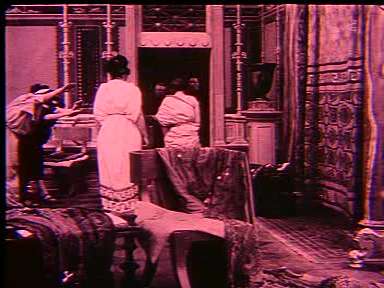
Directed by Enrico Guazzoni
Scenario by Enrico Guazzoni, from a novel by Henryk Sienkiewicz
Amleto Novelli (Vinicius), Gustav Serena (Petronius), Amelia Cattaneo (Eunice), Carlo Cattaneo (Nero)
The birth of the motion picture epic is generally dated to the 1913-1914 Italian films Quo vadis, The Last Days of Pompeii, Cabiria and Cajus Julius Cesar, many of them based on a standard set of 19th century religious novels that would be made and remade over the next half of the 20th century. One of several specialists in the genre, Enrico Guazzoni filmed this second version Quo Vadis?, the prime exemplar of a subsidiary genre to “Life of Christ” films, one that might be called the “Christ vs. Caesar” genre. The title of this film means “Where are you going?” and the question is posed by the Ascended Christ to Peter in a vision as the latter departs Rome on the eve of an Imperial persecution. The main story, however, focuses on a Roman commander, Vinicius, who falls for a Christian girl, Lygia, and is so drawn into the underground Christian community, experiencing a personal transformation along the way.Read More »

